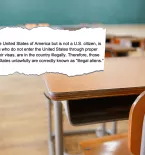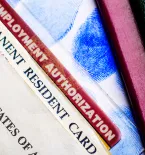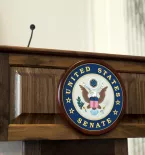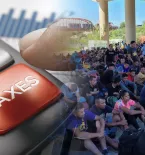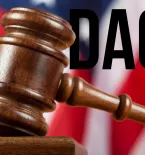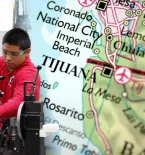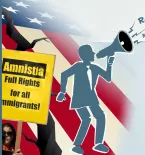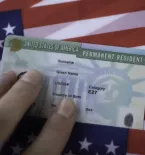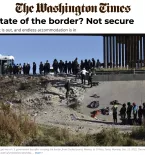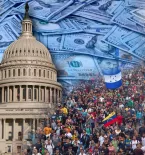
Amnesty
Amnesty is the granting of legal status to foreign nationals despite the fact they illegally entered the United States or illegally overstayed their work or travel visa.
Black’s Law Dictionary defines amnesty as: A sovereign act of pardon and oblivion for past acts, granted by a government to all persons (or to certain persons) who have been guilty of crime or delict, generally political offenses.
Amnesty is also referred to as legalization. The Congressional Research Service, an independent arm that supports Congress, loosely defines legalization as the granting of a lawful immigration status to an unlawfully present alien so that he or she is no longer subject to removal under the Immigration and Nationality Act (INA).
FAIR has advocated against amnesty for several reasons, including the following:
- Amnesty rewards and encourages more illegal immigration;
- Amnesty undermines the rule of law;
- Amnesty is unfair to legal immigrants;
- Amnesty allows aliens to circumvent the long-standing immigration programs established by Congress;
- Amnesty undermines unemployed and struggling American workers;
- Amnesty is costly, now and in the future, and
- Amnesty programs are usually riddled with fraud
Congress, in 1929, created a provision in law to include a “registry” allowing illegally present aliens in the United States to obtain lawful permanent residence (LPR) if they entered the country before a specific date. This cutoff date, which originally applied to those who entered before June 3, 1921, required that aliens demonstrate good moral character and continuously reside in the U.S. since they entered. That cutoff date was updated several times. Today, the registry is effectively obsolete as the date has been fixed at 1972 since Congress last amended the statute in 1986.
In 1986, Congress granted amnesty to three million illegal aliens through the passage of the Immigration Reform and Control Act (IRCA), allowing them to obtain lawful permanent residence status. That bill, also known as the Simpson-Mazzoli Act, was signed into law by President Reagan on November 6, 1986. It opened a door that politicians since then have failed to close. This legalization massively incentivized more illegal immigration and sent a message to illegal aliens that the law would not be enforced and one day, they, too, could benefit from amnesty if they waited.
The 1986 law was authored to be a 3-legged stool – control of illegal immigration, a legalization program, and reform of legal immigration. However, the law allowed people to be legalized first before any enforcement or workplace compliance went into effect. The committee report accompanying IRCA stated, “the solution lies in legalizing the status of aliens who have been present in the United States for several years, recognizing that past failures to enforce the immigration laws have allowed them to enter and to settle here.” When President Reagan signed IRCA into law, he stated that the legislation was a major step toward meeting the challenge to our sovereignty while at the same time preserving and enhancing the nation’s heritage of legal immigration.
In 2000, Congress again passed legislation to allow certain illegal aliens to qualify for LPR status, regardless of how one entered or if they were working without authorization. This time, Congress adopted the Legal Immigration Family Equity (LIFE) Act and LIFE Act Amendments of 2000, which established section 245(i) within the INA. Certain aliens were eligible to apply for green cards by filing a form and paying a $1,000 fee.
In 1996, Congress amended the INA to create “cancellation of removal.” Cancellation of removal allows unlawfully present aliens who have been in the U.S. for at least ten years to avoid deportation by claiming hardship. During immigration proceedings, aliens may seek amnesty through cancellation of removal if they can establish “exceptional and extremely unusual” hardship to family members.
In addition to major amnesty bills, Congress has also passed various amendments to the Immigration and Nationality Act that essentially allow people in the country illegally to adjust their status and be pardoned for their immigration violations. The Executive Branch has also used various statutes to push the envelope and create backdoor amnesty programs through regulation or policy.
Temporary Protected Status (TPS) is an immigration protection created by Congress in the Immigration Act of 1990 to provide temporary relief for people in the United States who could not return to their home country. TPS is considered a form of humanitarian relief that provides a temporary stay of deportation and employment authorization for foreign nationals of countries designated by the Secretary of Homeland Security. However, history has shown that a TPS designation is anything but temporary as aliens from that country (whether they entered or stayed illegally or not) have been allowed to live in the United States without fear of removal.
Deferred Enforced Departure (DED) is a concept, developed over the course of decades, that allows the President to use his foreign affairs powers to provide blanket protection from deportation, work authorization, and even permission to travel internationally, to any population of aliens for any period of time. It is not authorized by statute and, indeed, its use has never been upheld by the Supreme Court. Yet, if the President issues an order granting DED to an alien or group of aliens, they will be shielded from deportation.
Those illegally present in the country can also benefit from Deferred Action, protecting them from removal and allowing them to work. In 2012, President Obama established the Deferred Action for Childhood Arrivals program (also known as DACA) after attempts to pass the “DREAM” Act failed. The DACA program aimed to provide a form of de-facto amnesty to certain illegal aliens who arrived in the country before the age of 16. The program gave these illegal aliens temporary, renewable protection from deportation for two-year terms, and also provided them temporary work permits. Overall, nearly 800,000 illegal aliens have taken advantage of the program since its inception. Former President Donald Trump attempted to phase out DACA beginning in 2017, but constant litigation kept the program alive for the rest of his tenure as president. On President Biden’s first day in office, he signed an executive order directing government officials to preserve and strengthen the program.[1]
Several legislative proposals over the years would have granted amnesty to certain, broad populations of illegal aliens in the United States. These bills are often described as “comprehensive immigration reform” by the left because, in their mind, reform is incomplete without a path to citizenship for those illegally in the country.
In the past, notably 2006, 2007, and 2013, Congress nearly passed legislation that included amnesty for illegal aliens. Some required the border to be secured first, and some laid out a ten-year plan for aliens seeking to become lawfully present. FAIR successfully fought against passage of these amnesties.
On January 20, 2021, President Biden proposed a bill entitled, “The U.S. Citizenship Act of 2021” with the goal of “restoring humanity and American values to our immigration system.”[2] As described by President Biden, his bill would “provide hardworking people who enrich our communities every day and who have lived here for years, in some cases for decades, an opportunity to earn citizenship.”
Most recently, in late 2023, members of Congress called for amnesty as part of any border security legislation. FAIR continues to oppose any deal that grants amnesty to illegal aliens, especially in return for border security.
Since 1986, the cost of illegal immigration has soared. FAIR, in 2023, estimated that the net cost of illegal immigration to American taxpayers was $150.7 billion each year. These costs do not disappear once an alien receives legal status. Indeed, granting amnesty to illegal aliens typically increases the costs to American taxpayers as legalized aliens start to become eligible for major benefits programs such as Medicare and Medicaid.
Thus, amnesty makes little economic sense. Illegal aliens have lower education levels and earn significantly less than native-born American workers. Education levels and income levels are important predictors of whether an individual is a net contributor to the tax base i.e., pays more in tax than he or she takes out in services and programs. The combination of lower education levels, lower wages[3] and larger family sizes[4] leads illegal aliens to heavily use welfare programs, and given they pay little or no tax (if they work purely for cash for example), then this is likely to make them a net drain on the fiscal system. Even if their earnings were regularized and taxed, their lower wages would still yield a small tax take.
- Since 1985, approximately 60,000 people have adjusted to lawful permanent residence under the registry provision enacted and updated by Congress.[5]
- In 1986, there was an estimated one million people in the country illegally.
- The last time America granted a mass amnesty, via the Immigration Reform and Control Act of 1986, approximately three million illegals were provided a path to citizenship.[6]
- The population of illegal immigrants more than doubled in the years that followed and in 2023 stands at nearly 17 million.[7]
- Since the program’s creation in 2012, more than 800,000 people have been granted deferred action under Deferred Action for Childhood Arrivals (DACA) at one time or another.[8]
- Public support for granting amnesty to DACA recipients has dropped 15 percentage points between 2018 and 2022.[9]
Amnesty severely undermines the rule of law, allowing immigration violations to be ignored and giving a false sense that other crimes can be committed without impunity. The granting of amnesty also inevitably fosters the hopes of illegal immigrants that they can attain a future amnesty.
Amnesty is also deeply unfair to legal immigrants. Legal immigrants must wait in line (often outside of the U.S.), pay application and legal fees, undergo health and criminal vetting and prove they are not inadmissible under the law (including that they will not likely become a public charge). Most applicants for immigrant visas must also provide evidence such as financial documents and a signed affidavit of support from a sponsor, attend an interview, and continue to respond to the government’s concern about eligibility.
While Congress has enacted amnesty programs in the past, FAIR has been able to fight off massive new proposals that would degrade the rule of law even further. The ever-persistent open-borders, pro-mass-migration lobby will undoubtedly push more amnesties in the future. FAIR is here to match their determination and help oppose and defeat such harmful proposals.
To download the PDF of this page click here.
Endnotes
[1] https://www.fairus.org/legislation/reports-and-analysis/daca-what-you-need-know
[2] https://www.whitehouse.gov/briefing-room/statements-releases/2021/01/20/fact-sheet
[3] https://immigrantdataca.org/indicators/median-hourly-wage
[4] https://www.pewresearch.org/hispanic/2018/11/27/most-unauthorized-immigrants-live-with-family-members
[5] https://crsreports.congress.gov/product/pdf/RL/RL30578
[6] https://bipartisanpolicy.org/blog/moving-beyond-amnesty-and-border-security-as-the-solutions-for-undocumented-migration/
[7] https://www.washingtonpost.com/news/wonk/wp/2013/01/30/in-1986-congress-tried-to-solve-immigration-why-didnt-it-work/
[8] https://www.migrationpolicy.org/news/shrinking-number-daca-participants
[9] https://www.ipsos.com/en-us/news-polls/npr-immigration-perceptions-august-2022

